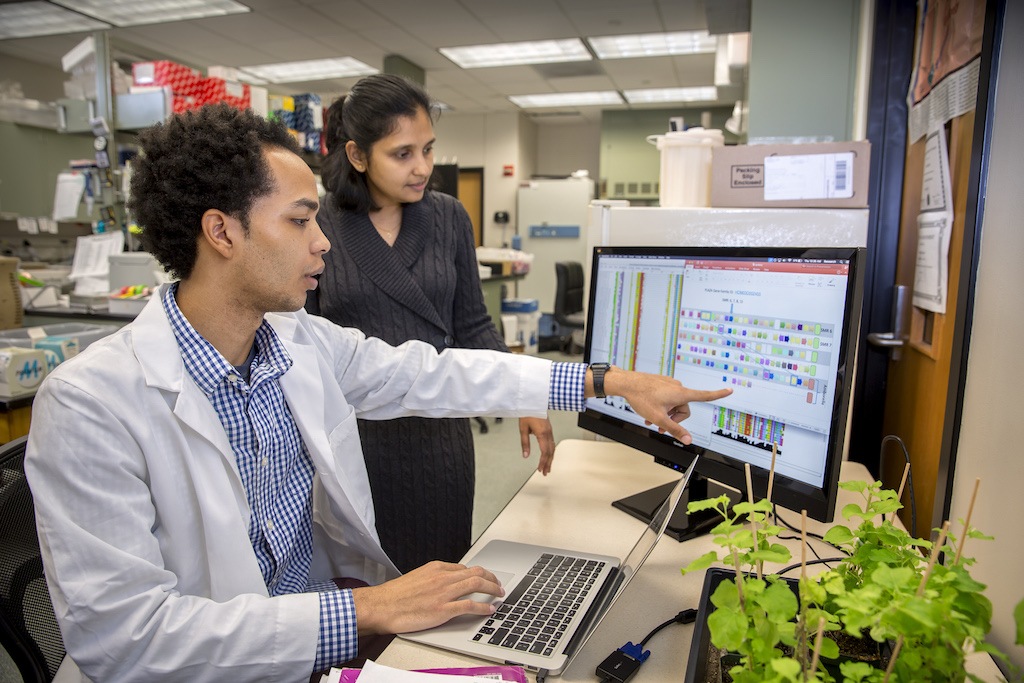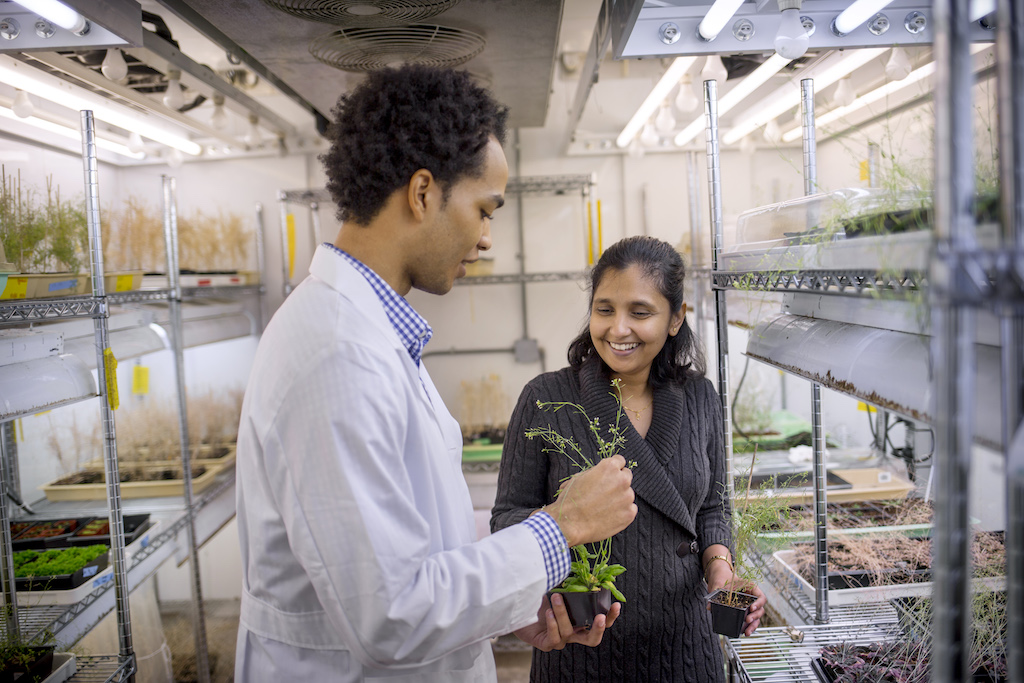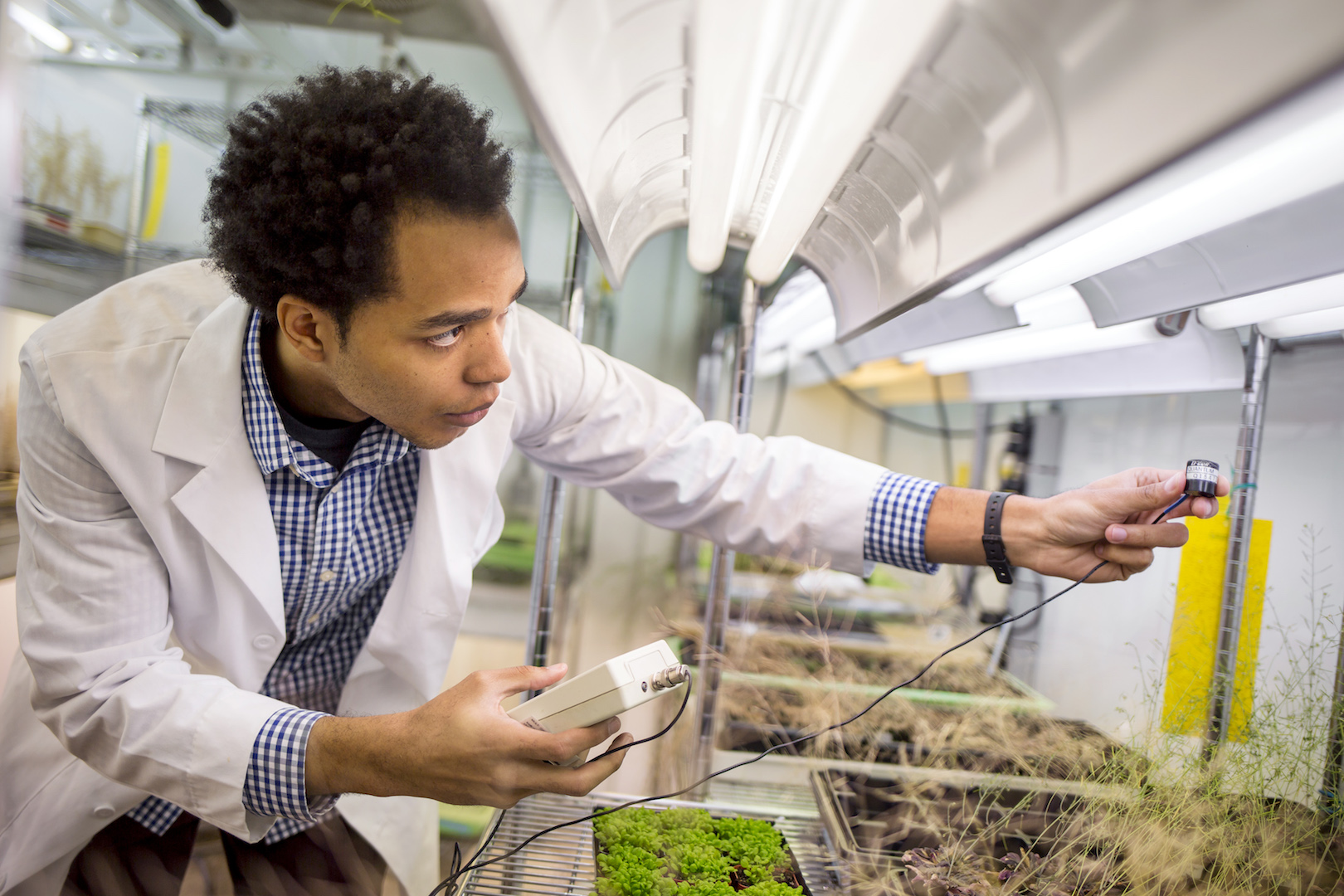Young Emerging Scientist, Matthew Johnson Develops Technological Tool to Identify SMR Genes of Plants
When Mathew Johnson, a senior studying biology at LSU, began fixing computers for the Department of Biological Sciences, little did he know it would lead to an opportunity to explore solutions for a sustainable agricultural future.
With the support of the Ronald E. McNair Research Scholars program, operated through LSU’s University College, and the leadership of Maheshi Dassanayake, Ph.D., Assistant Professor in the Department of Biological Sciences and primary investigator of the Comparative Functional and Evolutionary Genomics
Lab, Johnson realized a passion for research. 
“When I first came to LSU I had a lot of background with technology so I took a job
as an IT intern, and I spent a lot of time fixing computers in the labs. I became
interested in research and began asking professors about their works.”
Dassanayake, saw a natural fit for her lab, and Johnson became one of eight undergraduate researchers who joined a team which included, a research assistant professor in the lab, a lab manager, a post-doctoral scientist, and three graduate students.
Johnson explained, “I was more acclimated to computers and writing code, so she introduced me to the field of bioinformatics. I wrote scripts to facilitate research about a specific gene family.”
Sharing how his research team discovered more efficient ways to identify genes, Johnson stated, “The gene family of interest was really hard to find, especially when you have over 30,000 sequences to look through. It can become difficult with the already existing algorithms they have, so I spent the summer learning a programming language and using that to develop a tool to find SMR genes.”
Clarifying the broader impacts of their project, Dassanayake stated, “He’s working with a particular family of genes. These genes control plant development and plant growth modulated by environmental stress, such as salinity, extreme temperatures, and other erratic stressors. These genes regulate how big the plant cell can grow and how quickly the plants can respond to environmental stress. He is looking at more than 20 genomes—crops and non-crops to observe how cell cycle is regulated and is evolving in all lineages of plants in an effort to study the evolution of this gene family.” The research could also help to understand cancer. “It’s a gene that controls how cells divide, and that has larger implications outside of the plant, since cell cycle regulated genes are important in cancer research.”
For Johnson, research was the most important part of his LSU experience. “I was involved in professional organizations and clubs, but I spend most of my time outside of class with the research team in Dr. Dassanayake’s lab and at my job at Women’s Hospital in Baton Rouge.”
Joseph Givens, Director of the McNair Research Scholars program, argues that some
students aren’t aware of the leadership opportunities in research. “This is a great
example of why I would like for our students at LSU to broaden their understanding
of leadership and involvement. Student activities are an essential part of the college
experience, yet, if the students overlook academic leadership, then they are not getting
the full picture.” 
Dassanayake reflects on Johnson’s leadership stating, “I see Matthews as a young emerging scientist. He already has a co-authorship on a peer-reviewed publication in The Plant Cell, a journal ranked first in impact among plant science journals..”
Johnson appreciates the academic support of McNair Research Scholars. “McNair rounded everything out for me. We had workshops about research methodology, writing abstracts, and creating manuscripts.” Dassanayake appreciated the structure of the program design. “McNair gives faculty mentors a platform to showcase our research. This is an added incentive. As a faculty mentor, I used Matthew’s poster and presentation sessions as deadlines and benchmarks for his research.”
Givens praises the volunteer efforts of Dassanayake and other faculty mentors. “There is selflessness about contributing to the growth of a student. There’s also a level of trust involved in allowing a student to work with samples and equipment.”
Dassanayake feels that working with undergraduate researchers is a rewarding experience. “It’s actually fun to work with very engaging and enthusiastic students, and I’m lucky in that way. Matthew and several others in the lab are very enthusiastic and dedicated to their research. That motivates me to be prepared for their questions, and to excel in my work.”
After graduating in May 2016, Johnson plans to continue researching in medical school. “I just interviewed at LSU School of Medicine in Shreveport, and they shared opportunities to be involved in medical research. There is a growing field of personalized medicine that explores how drugs interact with specific people based on their genomes. My goal is to take everything I learned here in Dr. Dassanayake’s lab and apply it to this type of medical research.”
*** Broken a:84776 www: GOLD Matthew Johnson ***
About LSU University College
Since 1933, LSU University College has served as the portal of entry for students enrolled at LSU. Academic and personal success is the hallmark of a well-rounded student, and University College provides a foundation of support services for students beginning their academic careers at LSU. University College has two enrollment divisions: The Center for Freshman Year and The Center for Advising and Counseling. Additionally, University College offers retention-specific programs: Student Support Services, Ronald E. McNair Research Scholars, and Summer Scholars, and hosts Phi Eta Sigma, a national honor society rewarding first-collegiate-year scholarship. These academic support programs focus on particular student populations and are a significant part of the role and mission of University College.
The Ronald E. McNair Postbaccalaureate Achievement Program funded by a federal grant from the US Department of Education TRIO, promotes a new cohort of scholars that more accurately reflects the emergent diversity in life experiences, cultures, and perspectives represented in academia by preparing students who are first-generation, low-income, and underrepresented in graduate education for doctoral studies. McNair Research Scholars connects LSU undergraduate students with faculty-directed research experiences, provide individualized advisement, and foster knowledge of the graduate school application process. Student scholars conduct research under the mentorship of some of the most distinguished faculty in the country and communicate the results of their work through publications and workshops.
For more information on LSU University College, visit www.uc.lsu.edu or follow the conversation at www.facebook.com/LSU.UniversityCollege.
